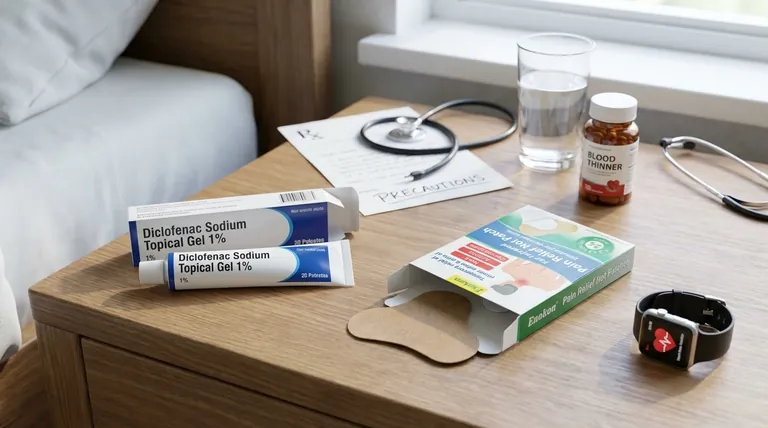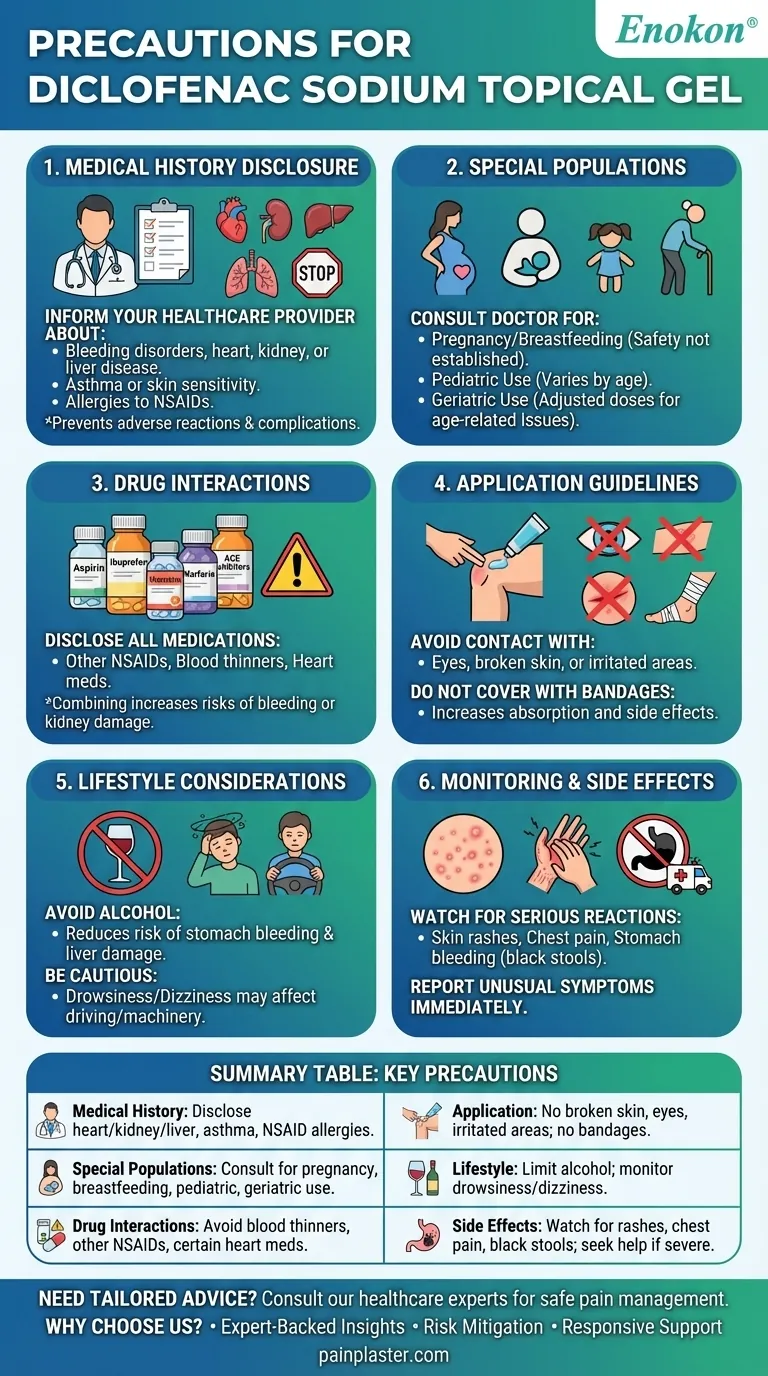Before using diclofenac sodium topical gel, it's crucial to take several precautions to ensure safety and effectiveness. These include consulting your healthcare provider about existing medical conditions, allergies, and medications, as well as avoiding application on broken skin or sensitive areas like the eyes. Special considerations apply to pregnant or breastfeeding individuals, children, and the elderly. Additionally, be aware of potential side effects like heart risks, stomach bleeding, and skin reactions, and avoid alcohol consumption while using the gel.

Key Points Explained:
-
Medical History Disclosure
- Inform your healthcare provider if you have:
- Bleeding disorders, heart disease, high blood pressure, or kidney/liver disease.
- Asthma or skin sensitivity.
- Allergies to NSAIDs or other substances.
- This helps prevent adverse reactions or complications, as diclofenac can exacerbate certain conditions.
- Inform your healthcare provider if you have:
-
Special Populations
- Pregnancy/Breastfeeding: Safety is not well-established; consult a doctor before use.
- Pediatric Use: Efficacy and safety may vary by age; follow pediatrician guidance.
- Geriatric Use: Older adults may need adjusted doses due to age-related kidney or heart issues.
-
Drug Interactions
- Disclose all medications, especially:
- Other NSAIDs (e.g., aspirin, ibuprofen).
- Blood thinners (e.g., warfarin).
- Certain heart medications (e.g., ACE inhibitors).
- Combining these can increase risks like bleeding or kidney damage.
- Disclose all medications, especially:
-
Application Guidelines
- Avoid contact with eyes, broken skin, or irritated areas to prevent irritation or systemic absorption.
- Do not cover treated areas with bandages, as this may increase drug absorption and side effects.
-
Lifestyle Considerations
- Avoid alcohol to reduce the risk of stomach bleeding or liver damage.
- Be cautious of drowsiness or dizziness, which may affect driving or operating machinery.
-
Monitoring and Side Effects
- Watch for serious reactions like:
- Skin rashes or allergic responses.
- Signs of heart issues (chest pain) or stomach bleeding (black stools).
- Report any unusual symptoms to your healthcare provider immediately.
- Watch for serious reactions like:
By following these precautions, you can minimize risks and use diclofenac sodium topical gel safely for pain relief. Always prioritize professional medical advice tailored to your specific health profile.
Summary Table:
| Precautions for Diclofenac Sodium Gel | Key Considerations |
|---|---|
| Medical History | Disclose heart/kidney/liver conditions, asthma, allergies to NSAIDs. |
| Special Populations | Consult doctors for pregnancy, breastfeeding, pediatric, or geriatric use. |
| Drug Interactions | Avoid combining with blood thinners, other NSAIDs, or certain heart medications. |
| Application | Do not apply on broken skin, eyes, or irritated areas; avoid bandaging. |
| Lifestyle | Limit alcohol; monitor drowsiness/dizziness. |
| Side Effects | Watch for skin rashes, chest pain, or black stools; seek immediate medical help if severe. |
Need tailored advice for diclofenac sodium gel? Consult our healthcare experts to ensure safe and effective pain management. Contact us now for personalized guidance based on your medical history and needs.
Why choose us?
- Expert-Backed Insights: Get clarity on precautions specific to your health profile.
- Risk Mitigation: Learn how to avoid adverse interactions or complications.
- Responsive Support: Reach out for urgent concerns about side effects or application.
Don’t compromise on safety—reach out today!
Visual Guide

Related Products
- Far Infrared Deep Heat Relief Patches Medicated Pain Relief Patches
- Asthma Cough and Pain Relief Patch for Adults and Kids
- Far Infrared Heat Pain Relief Patches Transdermal Patches
- Heating Pain Relief Patches for Menstrual Cramps
- Prostate Pain Kidney Health Care Patch for Men
People Also Ask
- How effective are pain relief patches for muscle pain? Target Localized Pain with Transdermal Delivery
- How should pain relief patches be applied and used? A Guide to Safe & Effective Targeted Relief
- How do pain relief patches compare to other pain relief methods? Discover Targeted, Long-Lasting Relief
- How often should pain relief patches be used? Get the Right Schedule for Targeted Relief
- How quickly does the Deep Heat Pain Relief Back Patch activate and how long does it provide warmth? Get 16-Hour Relief

















